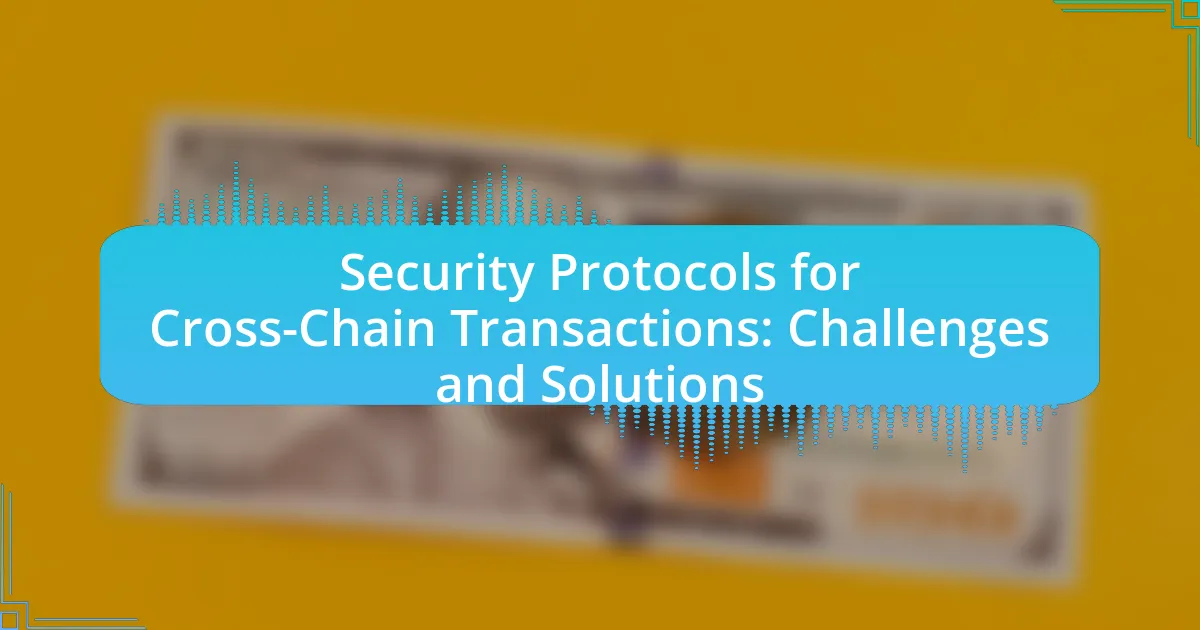Smart contracts are self-executing agreements coded on blockchain technology that enhance security by automating processes and minimizing human error. They operate without intermediaries, ensuring that transactions are executed only when predefined conditions are met, which significantly reduces the risk of fraud and manipulation. The article explores the functionality, key components, and benefits of smart contracts, including their role in improving efficiency and trust in various sectors. Additionally, it addresses the challenges and limitations associated with smart contract implementation, such as security vulnerabilities and legal recognition, while outlining best practices for development and future trends in blockchain security protocols.

What are Smart Contracts and Their Role in Blockchain Security?
Smart contracts are self-executing contracts with the terms of the agreement directly written into code, operating on blockchain technology. They enhance blockchain security by automating processes, reducing the risk of human error, and ensuring that transactions are executed only when predefined conditions are met. This automation minimizes the potential for fraud and manipulation, as the code is immutable and transparent, allowing all parties to verify the contract’s execution. According to a report by the World Economic Forum, smart contracts can significantly reduce transaction costs and increase efficiency in various sectors, further solidifying their role in securing blockchain transactions.
How do Smart Contracts function within a blockchain ecosystem?
Smart contracts function as self-executing agreements with the terms directly written into code on a blockchain. They automate processes by executing predefined actions when specific conditions are met, thereby eliminating the need for intermediaries. For example, in Ethereum, smart contracts are deployed on the blockchain and can facilitate transactions, enforce agreements, and manage assets without human intervention. This automation enhances security by reducing the risk of fraud and manipulation, as the code is immutable and transparent, allowing all parties to verify the contract’s terms. The decentralized nature of blockchain ensures that once a smart contract is executed, it cannot be altered, providing a reliable and tamper-proof mechanism for executing agreements.
What are the key components of Smart Contracts?
The key components of smart contracts include code, execution environment, and the blockchain network. The code defines the rules and conditions of the contract, typically written in programming languages like Solidity. The execution environment, often a virtual machine, processes the contract’s code when triggered by specific events. The blockchain network serves as the decentralized ledger that records all transactions and ensures transparency and immutability. These components work together to automate and enforce agreements without intermediaries, enhancing security and trust in blockchain applications.
How do Smart Contracts ensure trust and transparency?
Smart contracts ensure trust and transparency by automating and enforcing agreements through code on a blockchain. This automation eliminates the need for intermediaries, reducing the risk of manipulation or fraud. The immutable nature of blockchain technology guarantees that once a smart contract is deployed, its terms cannot be altered, ensuring that all parties adhere to the agreed-upon conditions. Additionally, the transparency of blockchain allows all participants to view the contract’s execution and outcomes in real-time, fostering accountability. According to a report by the World Economic Forum, smart contracts can significantly reduce transaction costs and increase efficiency, further reinforcing their role in establishing trust and transparency in various applications.
Why are Smart Contracts essential for enhancing security protocols?
Smart contracts are essential for enhancing security protocols because they automate and enforce agreements without the need for intermediaries, reducing the risk of human error and fraud. By utilizing blockchain technology, smart contracts ensure that transactions are immutable and transparent, which significantly increases trust among parties involved. For instance, a study by the World Economic Forum indicates that by 2025, 10% of global GDP could be stored on blockchain, highlighting the growing reliance on smart contracts for secure transactions. This automation and transparency are critical in sectors like finance and supply chain management, where security and trust are paramount.
What vulnerabilities do Smart Contracts address in blockchain technology?
Smart contracts address vulnerabilities such as trust issues, execution errors, and fraud in blockchain technology. By automating transactions and enforcing agreements through code, smart contracts eliminate the need for intermediaries, thereby reducing the risk of human error and manipulation. For instance, the Ethereum blockchain utilizes smart contracts to ensure that transactions are executed exactly as programmed, which mitigates the risk of unauthorized changes. Additionally, smart contracts enhance security by providing transparency and immutability, making it difficult for malicious actors to alter the contract once deployed. This capability is crucial in preventing fraud and ensuring that all parties adhere to the agreed terms, as evidenced by the increasing adoption of smart contracts in various sectors, including finance and supply chain management.
How do Smart Contracts mitigate risks associated with traditional contracts?
Smart contracts mitigate risks associated with traditional contracts by automating execution and enforcing terms through code, which reduces human error and fraud. Unlike traditional contracts that rely on intermediaries for enforcement, smart contracts operate on blockchain technology, ensuring transparency and immutability. This means that once a smart contract is deployed, its terms cannot be altered, which protects against disputes and manipulation. Furthermore, smart contracts execute automatically when predefined conditions are met, eliminating delays and ensuring timely performance. According to a report by the World Economic Forum, the use of smart contracts can reduce transaction costs by up to 30%, highlighting their efficiency and reliability compared to traditional methods.

What are the Benefits of Using Smart Contracts for Blockchain Security?
Smart contracts enhance blockchain security by automating and enforcing agreements without intermediaries. This automation reduces the risk of human error and fraud, as smart contracts execute predefined conditions transparently and immutably on the blockchain. Additionally, they provide a secure and tamper-proof environment, ensuring that once a contract is deployed, it cannot be altered, which protects against unauthorized changes. According to a report by the World Economic Forum, smart contracts can significantly lower transaction costs and increase efficiency, further reinforcing their role in secure blockchain transactions.
How do Smart Contracts improve efficiency in transactions?
Smart contracts improve efficiency in transactions by automating processes and eliminating the need for intermediaries. This automation reduces transaction times and costs, as smart contracts execute predefined conditions without human intervention. For instance, a study by the World Economic Forum estimates that smart contracts could reduce transaction costs by up to 30% in various industries. Additionally, the transparency and immutability of blockchain technology ensure that all parties have access to the same information, further streamlining the transaction process and minimizing disputes.
What role does automation play in Smart Contracts?
Automation is fundamental to smart contracts as it enables self-execution of contract terms without the need for intermediaries. This automation ensures that once predefined conditions are met, the contract automatically enforces the agreed-upon actions, such as transferring assets or executing transactions. For instance, in a financial agreement, if a payment condition is satisfied, the smart contract autonomously triggers the transfer of funds, thereby reducing the risk of human error and increasing efficiency. This self-executing nature of smart contracts enhances security by minimizing the potential for fraud and ensuring that all parties adhere to the contract terms as coded, thus reinforcing the integrity of blockchain transactions.
How do Smart Contracts reduce costs for businesses?
Smart contracts reduce costs for businesses by automating processes and eliminating the need for intermediaries. This automation streamlines operations, reduces transaction times, and minimizes human error, leading to significant savings. For instance, a study by Deloitte found that smart contracts can reduce transaction costs by up to 30% in certain industries by facilitating direct peer-to-peer transactions without the need for third-party verification. Additionally, the transparency and security provided by blockchain technology further decrease the risk of fraud, which can lead to additional cost savings for businesses.
What security features do Smart Contracts provide?
Smart contracts provide several key security features, including immutability, transparency, and automated execution. Immutability ensures that once a smart contract is deployed on the blockchain, its code cannot be altered, preventing unauthorized changes and enhancing trust. Transparency allows all participants to view the contract’s terms and conditions, which fosters accountability and reduces the risk of fraud. Automated execution eliminates the need for intermediaries, thereby minimizing human error and the potential for manipulation. These features collectively enhance the security of blockchain protocols by ensuring that transactions are executed as intended, without the risk of interference or deceit.
How do Smart Contracts enhance data integrity?
Smart contracts enhance data integrity by automating and enforcing the execution of agreements on a blockchain, ensuring that data cannot be altered once recorded. This immutability is achieved through cryptographic hashing, which secures the data and links it to previous transactions, creating a tamper-proof record. Additionally, smart contracts execute predefined conditions automatically, reducing the risk of human error or manipulation. The transparency of blockchain technology allows all participants to verify the integrity of the data independently, further reinforcing trust in the system.
What mechanisms do Smart Contracts use to prevent fraud?
Smart contracts utilize several mechanisms to prevent fraud, primarily through automation, transparency, and immutability. Automation ensures that contract terms are executed automatically when predefined conditions are met, reducing the risk of human error or manipulation. Transparency allows all parties to view the contract and its execution on the blockchain, making it difficult for any single party to alter the terms without consensus. Immutability ensures that once a smart contract is deployed, its code cannot be changed, preventing unauthorized modifications. These mechanisms collectively enhance security and trust in transactions, as evidenced by the increasing adoption of smart contracts in various industries, including finance and supply chain management.

What Challenges and Limitations Exist with Smart Contracts?
Smart contracts face several challenges and limitations, including security vulnerabilities, legal recognition, and scalability issues. Security vulnerabilities arise from coding errors or exploits, as evidenced by incidents like the DAO hack in 2016, where a flaw in the smart contract code led to a loss of $60 million in Ether. Legal recognition is another challenge, as many jurisdictions do not yet fully recognize smart contracts as legally binding agreements, creating uncertainty in enforcement. Additionally, scalability issues can hinder performance, as blockchain networks may struggle to process a high volume of transactions efficiently, leading to delays and increased costs. These factors collectively limit the effectiveness and adoption of smart contracts in enhancing blockchain security protocols.
What are the common pitfalls in Smart Contract implementation?
Common pitfalls in Smart Contract implementation include coding errors, lack of thorough testing, and inadequate security measures. Coding errors can lead to vulnerabilities that malicious actors can exploit, as seen in the DAO hack of 2016, where a flaw in the smart contract code resulted in the loss of $60 million worth of Ether. Lack of thorough testing can result in unforeseen bugs that compromise contract functionality, while inadequate security measures, such as failing to implement proper access controls, can expose contracts to unauthorized access. These issues highlight the importance of rigorous development practices and security audits in the smart contract lifecycle.
How can coding errors affect Smart Contract security?
Coding errors can significantly compromise Smart Contract security by introducing vulnerabilities that malicious actors can exploit. For instance, a well-known case is the DAO hack in 2016, where a coding flaw allowed an attacker to drain $60 million worth of Ether from the contract. Such errors can lead to unintended behaviors, allowing unauthorized access, loss of funds, or manipulation of contract logic. The Ethereum platform, which hosts many Smart Contracts, has documented numerous incidents where coding mistakes resulted in financial losses, highlighting the critical need for rigorous testing and auditing to ensure security.
What legal considerations must be addressed with Smart Contracts?
Legal considerations for smart contracts include enforceability, jurisdiction, compliance with existing laws, and liability issues. Enforceability is critical as smart contracts must meet legal standards to be recognized in court; for instance, they should demonstrate mutual consent and clear terms. Jurisdiction is important because the decentralized nature of blockchain can complicate which laws apply, especially when parties are in different countries. Compliance with existing laws, such as data protection regulations and financial regulations, is necessary to avoid legal penalties. Liability issues arise when determining who is responsible for errors or breaches in the contract, which can be complex given the automated nature of smart contracts. These considerations are essential to ensure that smart contracts function effectively within the legal framework.
How can organizations overcome challenges associated with Smart Contracts?
Organizations can overcome challenges associated with Smart Contracts by implementing comprehensive testing and auditing processes. These processes ensure that the code is free from vulnerabilities and functions as intended, reducing the risk of errors that could lead to financial loss or legal disputes. For instance, a study by ConsenSys reported that 70% of Smart Contracts contain bugs, highlighting the necessity for rigorous testing. Additionally, organizations can invest in training their teams on blockchain technology and Smart Contract development to enhance understanding and mitigate risks. By fostering collaboration with legal experts, organizations can also ensure that Smart Contracts comply with existing regulations, further minimizing potential legal challenges.
What best practices should be followed for Smart Contract development?
Best practices for Smart Contract development include thorough testing, code audits, and adherence to established standards. Thorough testing ensures that the contract behaves as expected under various conditions, reducing the risk of vulnerabilities. Code audits by independent experts help identify potential security flaws and improve overall reliability. Adhering to established standards, such as the ERC-20 or ERC-721 token standards, promotes interoperability and reduces the likelihood of errors. These practices are supported by industry reports indicating that over 70% of smart contract vulnerabilities arise from coding errors, emphasizing the importance of rigorous development protocols.
How can audits improve Smart Contract security?
Audits can significantly improve Smart Contract security by identifying vulnerabilities and ensuring compliance with best practices. Through systematic examination of the code, audits reveal potential flaws that could be exploited by malicious actors, thereby reducing the risk of financial loss and reputational damage. For instance, a study by ConsenSys found that 70% of smart contracts contain vulnerabilities, highlighting the necessity of thorough audits to mitigate these risks. By employing both automated tools and manual reviews, audits enhance the reliability and robustness of smart contracts, ultimately fostering greater trust in blockchain applications.
What are the Future Trends of Smart Contracts in Blockchain Security?
Future trends of smart contracts in blockchain security include increased automation, enhanced interoperability, and improved security protocols. Automation will streamline processes, reducing human error and increasing efficiency in contract execution. Enhanced interoperability will allow smart contracts to interact seamlessly across different blockchain platforms, fostering collaboration and innovation. Improved security protocols, such as formal verification methods, will ensure that smart contracts are rigorously tested for vulnerabilities before deployment, significantly reducing the risk of exploits. These trends are supported by the growing adoption of decentralized finance (DeFi) and the increasing demand for secure, transparent transactions in various industries.
How might advancements in technology impact Smart Contracts?
Advancements in technology can significantly enhance the functionality and efficiency of Smart Contracts. For instance, improvements in artificial intelligence and machine learning can enable Smart Contracts to execute more complex conditions and automate decision-making processes, thereby increasing their applicability across various industries. Additionally, advancements in blockchain scalability solutions, such as sharding and layer-2 protocols, can facilitate faster transaction processing and reduce costs associated with Smart Contract execution. These enhancements can lead to broader adoption and integration of Smart Contracts in sectors like finance, supply chain, and legal services, ultimately improving security and trust in blockchain protocols.
What role will Smart Contracts play in the evolution of blockchain security protocols?
Smart contracts will play a crucial role in the evolution of blockchain security protocols by automating and enforcing agreements without the need for intermediaries. This automation reduces the risk of human error and fraud, as smart contracts execute predefined conditions transparently and immutably on the blockchain. For instance, according to a report by the World Economic Forum, smart contracts can enhance security by ensuring that transactions are executed only when specific conditions are met, thereby minimizing vulnerabilities associated with manual processes. Additionally, the use of cryptographic techniques within smart contracts ensures that data integrity and confidentiality are maintained, further strengthening blockchain security protocols.
What practical steps can organizations take to implement Smart Contracts effectively?
Organizations can implement Smart Contracts effectively by following these practical steps: first, they should conduct a thorough assessment of their business processes to identify areas where Smart Contracts can add value, such as automating transactions or ensuring compliance. Next, organizations must choose a suitable blockchain platform that supports Smart Contracts, such as Ethereum or Hyperledger, ensuring it aligns with their specific needs and scalability requirements.
After selecting a platform, organizations should invest in training their staff on Smart Contract development and deployment, as well as on the underlying blockchain technology. This knowledge is crucial for effective implementation and maintenance. Additionally, organizations should collaborate with legal experts to ensure that Smart Contracts comply with relevant regulations and legal standards, thus minimizing risks associated with enforcement and interpretation.
Finally, organizations should conduct rigorous testing of Smart Contracts in a controlled environment before deploying them in a live setting. This step is essential to identify and rectify any potential vulnerabilities or bugs, ensuring the reliability and security of the Smart Contracts once they are operational.















